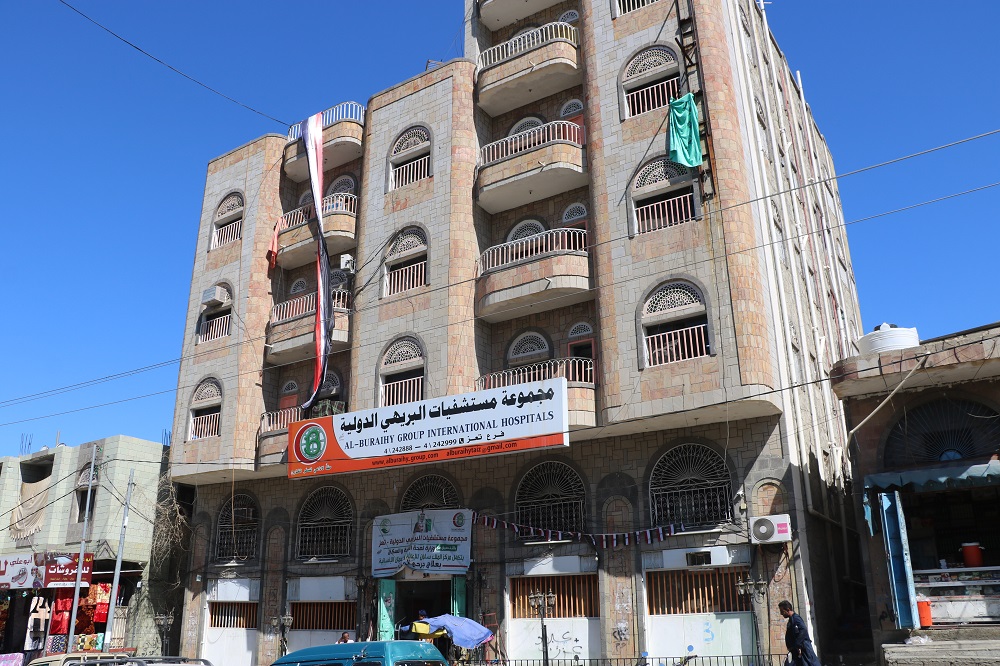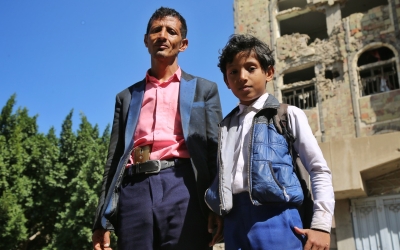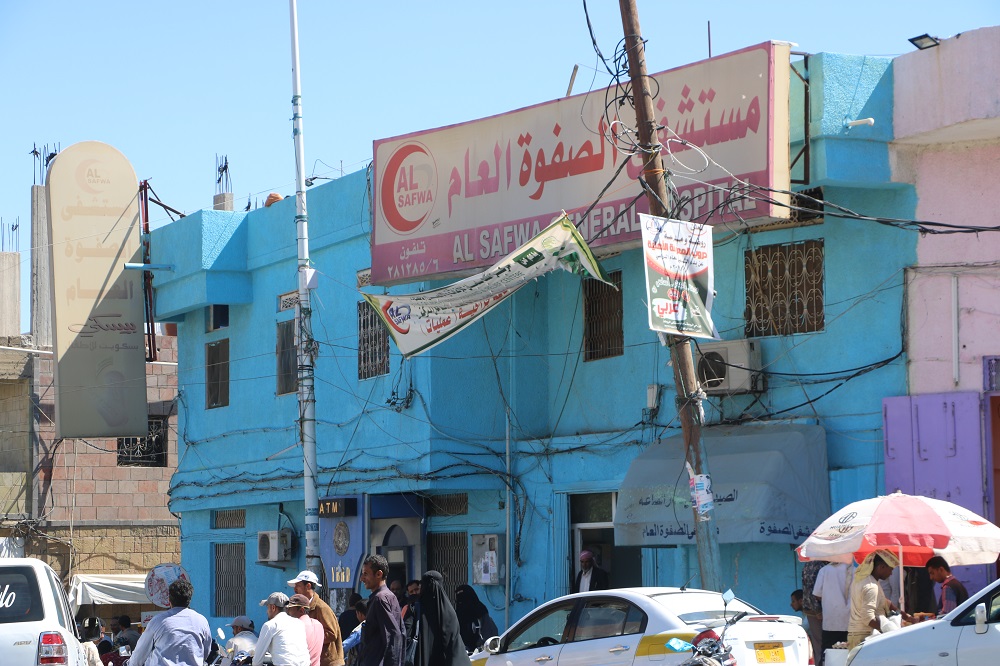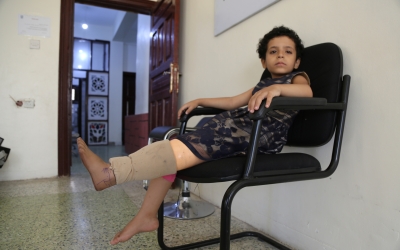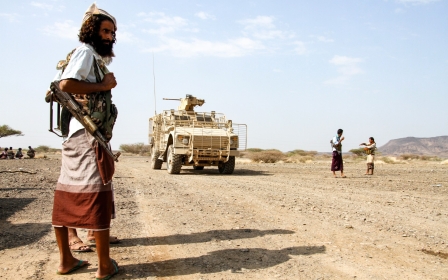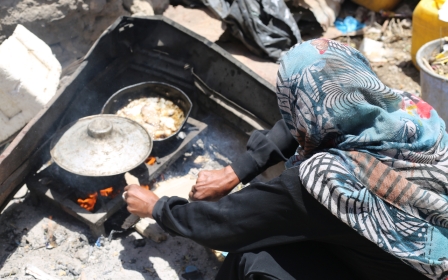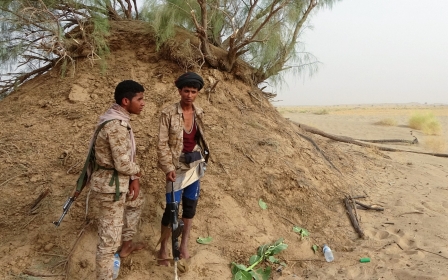REVEALED: How Yemen’s war-wounded suffered unnecessary amputations
Unnecessary amputations were performed on young children and others injured during Yemen’s civil war at private hospitals funded by a Saudi government aid agency, according to doctors and health officials.
An investigation by Arab Reporters for Investigative Journalism (ARIJ) for Middle East Eye raises serious questions about dozens of operations at three hospitals in the southwestern frontline city of Taiz between 2016 and 2018.
All three hospitals - Al-Buraihy, Al-Safwa and Al-Rawda - received financial support from Saudi Arabia's King Salman Humanitarian Aid and Relief Center (KSrelief).
The organisation has supported hundreds of aid projects in Yemen at a cost of almost $4bn since 2015, according to its own website.
It has also worked in the country with United Nations agencies including the World Health Organisation, the United Nations Population Fund and the World Food Programme.
New MEE newsletter: Jerusalem Dispatch
Sign up to get the latest insights and analysis on Israel-Palestine, alongside Turkey Unpacked and other MEE newsletters
The investigation, backed by testimonies from doctors, health officials and patients and their families, found that proper procedures were not followed by medical staff authorising and performing the operations.
It discovered that the qualifications of one foreign doctor involved in at least 44 amputations were not recognised in his own country.
And it found that KSrelief continued to fund two hospitals even after concerns were raised by local officials and through KSrelief’s own monitoring of their work.
KSrelief told MEE that it had provided support to hospitals in Taiz, Aden and Seiyun at the request of Yemen’s ministry of health.
It said its role was limited to financing treatment and it was not a supervisory authority. It said issues to do with medical procedures and the selection of medical staff were matters for Yemeni health officials.
Yemen’s health ministry told ARIJ that KSrelief’s contracts with the three hospitals were approved by local officials in Taiz. Local officials said they did not know who had approved the contracts. The ministry did not respond to MEE’s further questions seeking clarification.
Dr Abdulkafi Shamsan, the general manager of Al-Safwa hospital, told MEE that doctors at the hospital “did their best to save the wounded in a besieged city that was constantly bombarded at that time and in light of a severe shortage of medical supplies and surgeons”.
Neither Al-Buraihy nor Al-Rawda hospitals responded to requests for comment from ARIJ and MEE.
‘I could move my toes’
In July 2017, Dalia Muhammad, 25, was taken to Al-Buraihy hospital after stepping on a landmine while collecting water near her home in a village south of Taiz.
Her right leg, which was badly injured in the explosion, was amputated. But according to Muhammad, the doctor who examined her said that her injured left leg could be treated. He told others at the hospital that Muhammad would need a plate to be fitted in her injured leg followed by reconstructive surgery.
Muhammad said: “He told them it was the veins that were damaged. The nerves were healthy… I could even move my toes then.”
But the hospital did not treat her injuries. Eventually, she says, her leg was amputated after becoming gangrenous because her wounds were not cleaned properly.
In the same year, three-year-old Alaa Abdel-Fattah was taken to Al-Safwa hospital after being injured when her house was hit by a mortar shell.
She was subsequently moved to al-Rawda hospital where her left leg was amputated. But her father, Wisam Abdel-Fattah, believes the procedure was unnecessary.
He says he consulted another doctor who told him that those who had treated his daughter had made a “big mistake”.
MEE asked Al-Safwa hospital about Alaa Abdel-Fattah’s case and other issues raised by this article.
Shamsan, the hospital director, did not address her case specifically. But he said that patients and the wounded continued to choose the hospital because of its specialist surgical staff. He said official bodies and medical experts were welcome to visit the hospital to assess its work.
“You can ask an expert committee of doctors with experience of working in war zones to look at the files, the condition of the wounded, the nature of their injuries, the number of wounded who were brought to the emergency room, and the results in general.
“The patient or the wounded will look for many reasons when the results are not satisfactory to him, and this is the nature of humans.”
Damaged hospitals
Taiz has been the scene of intense fighting throughout the seven-year conflict between Houthi rebels and a Saudi-led coalition in which an estimated 233,000 people have been killed, according to United Nations figures.
A report by international aid organisation Doctors Without Borders (MSF) in January 2017 described the collapse of healthcare provision in the city and noted that “an unacceptably high proportion of the war-wounded are women and children”.
“Damaged hospitals and shortages of staff and essential supplies have resulted in the virtual collapse of Taiz's health service, severely compromising people's access to life-saving medical care,” MSF reported.
In August 2015, Al-Safwa and Al-Rawda hospitals were reported to be on the verge of shutting down because of fighting and a blockade imposed by Houthi fighters.
Mortadha al-Howaish, the director of Al-Safwa at the time, said the hospital lacked medical supplies necessary to its operating theatre and had been forced to ration the use of oxygen cylinders.
Suhail al-Dhubhani, director of Al-Rawda, also described shortages of oxygen cylinders and other supplies.
In 2016, KSrelief signed contracts with Al-Buraihy, Al-Safwa and Al-Rawda hospitals to support their work providing treatment to some of the city’s wounded.
KSrelief's contracts with Al-Buraihy and Al-Safwa hospitals were renewed in 2018. Al-Rawda was funded for only a few months, but doctors and officials say it continued to have a close relationship with the other two hospitals.
Doctors and local health officials told ARIJ that even the dire circumstances faced by medical staff in Taiz did not fully account for a sharp increase between 2016 and 2018 in the number of amputations being performed at the three KSrelief-funded hospitals.
In 2015, Taiz's Public Health and Population Office recorded 70 amputations. This figure rose to 230 the following year and 200 in 2017, before falling to 74 in 2018.
Between 2016 and 2018, 41 children underwent amputations at Taiz hospitals, compared with only one child in 2015, the data shows.
According to doctors who worked at the three hospitals, KSrelief paid $4,000 for each amputation.
They said amputations were sometimes preferred to more complex and more costly procedures that might have enabled patients to make full recoveries because they were cheaper and because of a lack of specialist staff.
Dr Mukhtar al-Malik, an orthopaedic surgeon who worked in the contracted hospitals, told ARIJ: “To eliminate these extra costs paid to doctors, the hospitals opted for amputating.”
Malik said he had refused to perform amputations which were subsequently carried out by other staff.
Ukrainian doctor
Other doctors said that cases such as Dalia Muhammad’s raised questions about how decisions to amputate were taken at the KSrelief-contracted hospitals.
Dr Abu Dhar al-Jundi, dean of the Faculty of Medicine at Taiz University, told ARIJ it should have been standard procedure that such decisions were taken collectively by several doctors with relevant medical specialties.
But documents seen by ARIJ suggest this did not happen routinely at Al-Buraihy hospital.
Instead three medical reports authorising surgery on Muhammad were signed by the same doctor, a Ukrainian national, who also carried out the operation; once as a general practitioner; then as an orthopaedic specialist; and finally as a vascular specialist.
ARIJ's investigation found at least 44 medical reports signed by the doctor. ARIJ also obtained a letter from the Ukrainian Ministry of Health which casts doubt on the authenticity of a certificate stating that the doctor had trained in orthopaedics and traumatology at a medical school in Kiev.
The letter was sent in response to a request from Taiz officials for clarification about the doctor's qualifications. It said the document could not be verified because its format did not match those issued by Ukraine's Ministry of Health.
Journalists working with ARIJ in Ukraine sought to contact the doctor via family members in his home city in eastern Ukraine but were unable to reach him for comment.
In June 2018, KSrelief announced that it had signed further contracts with Al-Safwa and Al-Buraihy hospitals. It said 4,797 patients had received treatment through its private hospital projects in Yemen. It also supports artificial limbs centres in Aden, Marib and Taiz.
But health officials at multiple agencies responsible for overseeing the Taiz hospitals’ contracts with KSrelief have said they do not know who approved the original contracts - or why they were approved.
They said the hospitals lacked basic equipment and suitable surgical facilities to deal with the sort of injuries they were contracted to treat, and cited broader issues caused by a lack of trained medical staff.
All three hospitals are located in converted residential buildings, rather than in purpose-built medical facilities.
Shamsan, the general manager of Al-Safwa, said the hospital had faced severe shortages of medical supplies and surgeons during the siege.
But he said: “The hospital is equipped with everything necessary to take the necessary measures to preserve life.”
Neither Al-Buraihy nor Al-Rawda hospitals responded to repeated requests for comment.
Dr Ilan Abdel Haq, deputy governor for health affairs in Taiz, told ARIJ that in many cases it appeared that amputations had been performed needlessly.
“The wounded person enters the hospital with first-degree wounds that specialists should deal with,” Abdel Haq said. “But hospital staff are newly trained graduates and, instead of treating them, adds to their injury.”
Yemen’s Ministry of Health told ARIJ the hospitals were selected and approved by local authorities in Taiz.
But Dr Abdul Rahim al-Sami, director general of the health office in Taiz, denied his office had signed off on the contracts and singled out Al-Buraihy hospital as unsuitable to deliver the sort of care it was contracted to deliver.
Sami told ARIJ: "We were not consulted in the contracting process. We would have had a different opinion on the process of granting contracts.”
Patients refused amputations
Some doctors said they tried to raise concerns at the time about how the hospitals were operating.
Malik, the orthopaedic surgeon, described one case in which he said hospital administrators at Al-Safwa had obstructed his efforts to save a patient's leg.
He said: “I arrived at the operating room and saw the wounded man. I asked that we try to save the patient’s leg, but the hospital administration refused, on the pretext that the bones were damaged.”
Malik said he could perform an operation to fix the bones so long as a vascular surgeon could operate on the man’s damaged veins.
But hospital administrators, Malik said, told him that the wounded man “would need several operations across a full year, and we are at war”.
“If your decision is amputation, you can call another doctor,” he said he told administrators.
MEE asked Al-Safwa hospital about Malik’s allegations. Shamsan, the hospital’s general manager, did not address them directly.
But he said: “We at Al-Safwa hospital are doctors. We have a responsibility towards all patients and wounded… Medics did a lot under difficult circumstances and our lives were constantly threatened due to war and chaos.”
In some cases, patients say they were able to refuse amputations and make full recoveries from their injuries.
In July 2017, Suhail Al-Najashi, 18, sustained numerous gunshot wounds including in his leg. He said he was advised by doctors at Al-Rawda hospital, and others then contracted by KSRelief, that only an amputation would save his life.
He said he had asked the hospital to call Malik, who had previously told him that he did not require an amputation. But, he said, this request was refused.
Najashi told ARIJ: “I lay on the operating bed twice for the purpose of amputation.”
Najashi finally refused to undergo the operation. He instead decided to travel to Egypt where his injuries were successfully treated at his own expense.
Other patients told ARIJ they had sought treatment at other hospitals in Taiz after being told they required amputations.
Salah Thabet Ismail, 28, said doctors at Al-Safwa and Al-Buraihy hospitals had advised him to undergo an amputation after he was injured in an explosion.
Instead, he went to Taiz Hospital where his injuries were successfully treated.
“I resorted to funding my own treatment so that I could walk on my feet," said Ismail.
Abdelmalik Yulda Shaf, an Uzbek orthopaedic surgeon who treated Ismail, told ARIJ: “We did not even think for a moment about amputating Salah.”
‘Repeated complaints’
The large number of amputations at the three hospitals in Taiz led to calls by local officials to suspend the transfer of patients to the facilities in 2017 and 2018.
In July 2018, Amin Ahmed Mahmoud, the then-governor of Taiz, attempted to cancel the contract between Al-Buraihy hospital and KSrelief.
In a letter sent to KSrelief general supervisor Dr Abdullah al-Rabiah, Mahmoud thanked him for the organisation’s “great and distinguished efforts in serving the wounded”.
But he called on Rabiah to cancel the contract with Al-Buraihy, citing “the repeated complaints from the wounded, the large number of medical errors, and the hospital’s lack of preparedness to treat the wounded in terms of staff and equipment”.
On the same day, Yemeni Minister of Health and Population Nasir Baoum sent a message to KSrelief saying he wanted the contract to continue, thanking the organisation for its “constant support”.
Addressing concerns about the hospital’s performance, he said the ministry had formed a medical committee of senior specialists to supervise the treatment of the wounded.
ARIJ has discovered that problems at the hospitals were also raised by the Skop Foundation, a Riyadh-based organisation that was contracted by KSrelief to monitor their work.
A Skop report dated January 2018, obtained by ARIJ, acknowledged that a shortage of vascular surgeons in the hospitals had led to amputations being carried out.
But two Skop employees, speaking on condition of anonymity, told ARIJ that KSrelief was unwilling to implement monitoring at Al-Buraihy Hospital.
Eventually, they said, KSrelief stopped Skop’s work in March 2018 after the foundation filed a report detailing deteriorating conditions and violations at the hospital.
The Skop Foundation declined to answer specific questions about its work and said its reports for KSrelief were not intended for publication.
KSrelief told MEE it had continued to work with Skop until the end of its contract with the organisation.
In response to questions from MEE about the issues raised in this article, KSrelief said it had funded private hospitals in Taiz, Aden and Seiyun at the request of the Yemeni Ministry of Health and that treatment at the hospitals was overseen by local medical committees.
A KSrelief spokesperson said: “The role of the centre is limited to financing treatment within the humanitarian response plan in Yemen, to alleviate the suffering of the brotherly Yemeni people.
"The centre is not authorised to interfere in medical opinions, and has no supervisory role over those hospitals, and it has nothing to do with the selection of medical staff affiliated with them.”
This article is available in French on Middle East Eye French edition.
Middle East Eye delivers independent and unrivalled coverage and analysis of the Middle East, North Africa and beyond. To learn more about republishing this content and the associated fees, please fill out this form. More about MEE can be found here.


